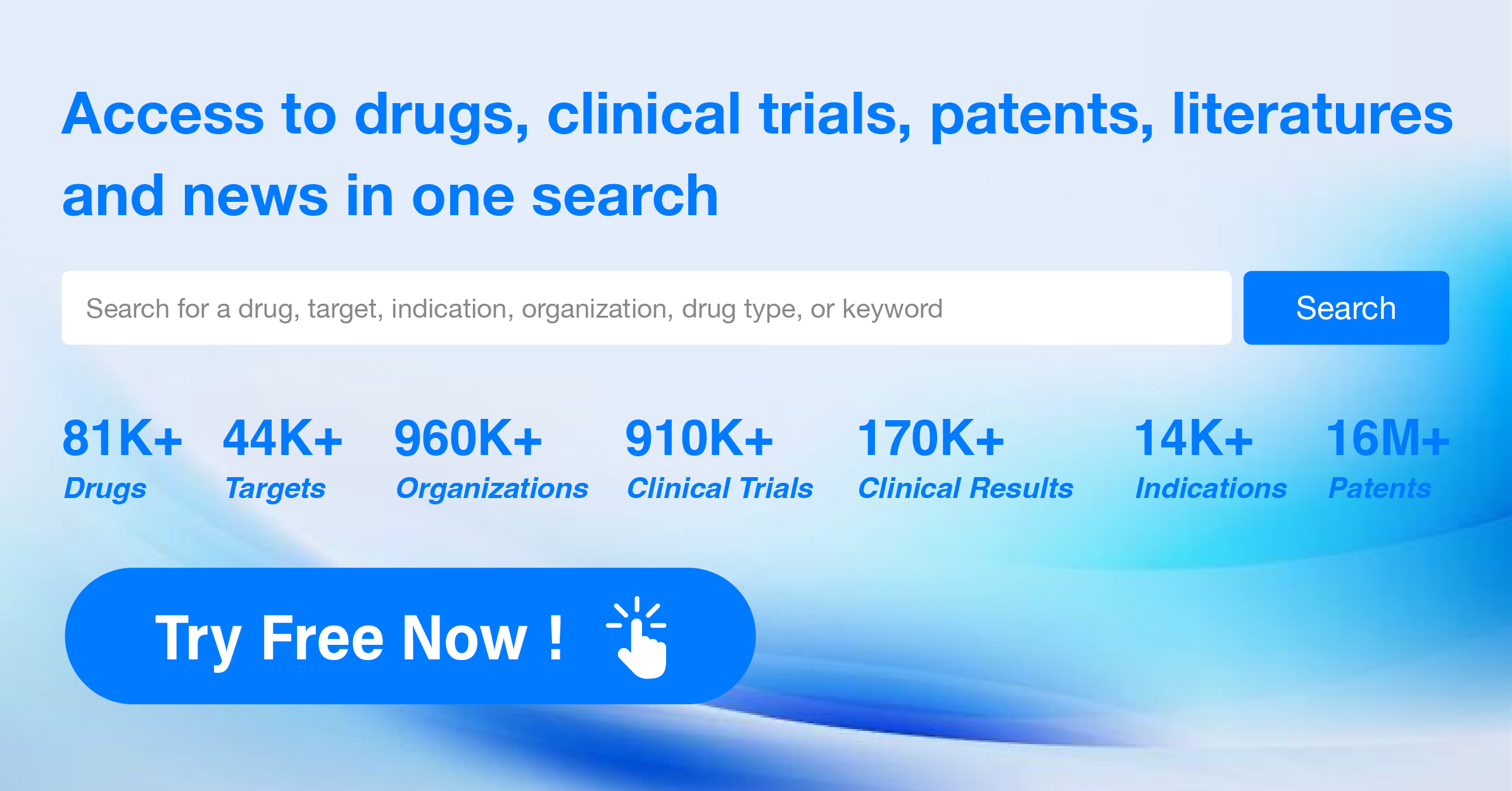Pharma Frontiers: Daily Digest of Global Pharmaceutical News - April 10
1.AstraZeneca's New PARP Inhibitor Saruparib Clinical Results Released
On April 9th, researchers announced at the American Association for Cancer Research (AACR) conference the latest clinical trial results of AstraZeneca's new-generation PARP1 inhibitor saruparib. Interim data analysis revealed that saruparib demonstrated a promising objective response rate and progression-free survival in treating patients with homologous recombination repair (HRR) deficient advanced breast cancer, with nearly half of the patients achieving a response. Although blocking the PARP1 enzyme may suffice to prevent DNA repair in HRR-deficient tumors, all PARP inhibitors currently approved by the U.S. FDA inhibit both PARP1 and PARP2, leading to potential toxic side effects which limit their use.
Saruparib is a PARP1-specific inhibitor and due to its lack of inhibition on PARP2 activity, it has a lower toxicity profile compared to other PARP inhibitors, allowing for administration at higher doses. PETRA is a multicenter phase 1/2 clinical trial evaluating the safety, tolerability, and efficacy of saruparib in 306 patients with previously treated HRR-deficient breast, ovarian, pancreatic, or prostate cancers harboring mutations in HRR-related genes, including BRCA1, BRCA2, PALB2, RAD51C, or RAD51D. Data indicates that among the 31 breast cancer patients treated with a 60 mg dose of saruparib, the objective response rate was 48.4%, with a median duration of response of 7.3 months and a median progression-free survival of 9.1 months.
In terms of safety, researchers reported that the observed adverse events were of a generally lesser severity compared to other PARP inhibitors. Pharmacokinetic studies demonstrated that patients maintained high blood concentrations of saruparib across all dosage levels, surpassing the concentrations of other PARP inhibitors observed in clinical trials. Analysis of biopsy-acquired tissues showed that saruparib could inhibit approximately 90% of PARP activity.
2.Bristol Myers Squibb announces positive clinical trial results for their KRAS inhibitor Krazati, achieving disease control in 85% of patients with advanced cancer!
On April 9th, Bristol Myers Squibb presented positive new results from the KRYSTAL-1 clinical trial at the 2024 American Association for Cancer Research (AACR) Annual Meeting. The study assessed the efficacy and safety of combining its KRAS G12C inhibitor Krazati (adagrasib) with cetuximab for the treatment of patients with previously treated advanced or metastatic colorectal cancer (CRC) harboring the KRAS G12C mutation. The analysis demonstrated that the disease was controlled in 85% of patients. The detailed trial results were also published in the Cancer Discovery journal.
Bristol Myers Squibb has submitted a supplemental New Drug Application (sNDA), which has been granted priority review by the FDA, with a PDUFA goal date set for June 21, 2024. Among 94 patients, the median follow-up duration for the Krazati plus cetuximab combination was 11.9 months. The analysis revealed that among the treated patients with KRAS G12C-mutated, locally advanced or metastatic CRC, the objective response rate (primary endpoint) was 34%, the median progression-free survival (PFS) was 6.9 months (95% CI: 5.7-7.4), and the median overall survival (OS) was 15.9 months (95% CI: 11.8-18.8). The median duration of response was 5.8 months. 85% of the patients experienced disease control.
Krazati is a potent, orally administered, highly specific inhibitor of KRAS G12C, designed for sustained target inhibition. It has a long half-life of 24 hours and extensive tissue distribution, capable of crossing the blood-brain barrier to maximize its therapeutic potential. In June 2021, Krazati was granted Breakthrough Therapy designation by the FDA and was approved in December 2022 for the treatment of patients with KRAS G12C-mutant, previously-treated non-small cell lung cancer (NSCLC).
3. LaNova Medicines Initiates Phase III Clinical Trials for CLDN18.2 ADC Development
On April 8th, the American clinical trial registry website, clinicaltrials.gov, showed that LaNova Medicines initiated a Phase III clinical trial of LM-302 as a third-line treatment for CLDN18.2 positive (CLDN18.2+) gastric or gastroesophageal junction (G/GEJ) adenocarcinoma. This product is the third CLDN18.2 ADC to enter Phase III following IBI343 and CMG901.
LM-302 is a CLDN18.2 ADC developed by LaNova Medicines based on its proprietary transmembrane protein antibody discovery platform, comprising a CLDN18.2-specific antibody, a cleavable linker, and the cytotoxic payload monomethyl auristatin E (MMAE). The product was granted three orphan drug designations by the FDA in 2021 for the treatment of pancreatic cancer, G/GEJ cancer, and cholangiocarcinoma. In May 2022, Turning Point (acquired by BMS) entered into a collaboration with LaNova Medicines, obtaining exclusive rights to develop and commercialize LM-302 globally, except for Greater China and Korea. LaNova Medicines is eligible for over one billion dollars in total milestone payments and is entitled to receive single to double-digit percentage tiered royalties on net sales from its partner's territories upon successful commercialization of LM-302. In March 2023, CANbridge Pharmaceuticals also partnered with LaNova Medicines to jointly advance a series of clinical studies on the combination of the PD-1/VEGF dual antibody ivonescimab (AK112) with LM-302 for relevant solid tumors.
CLDN proteins are important components of the tight junctions in epithelial cells, and their abnormal expression or dysregulation leads to structural damage and functional impairment of epithelial and endothelial cells, making them therapeutic targets or biomarkers for various diseases, including tumors, inflammatory bowel disease, and skin diseases. Among them, CLDN18.2 is mainly expressed in gastric epithelial cells. Research has found that CLDN18.2 is highly expressed or ectopically activated in primary malignancies such as gastric cancer, pancreatic, esophageal, ovarian, breast, and lung cancer. Given its potential for specific expression, it has become an emerging target for anti-tumor therapy.
4.Kelun Botai Biomedicine Announces Phase II Clinical Data for ADC Therapy Sacituzumab Govitecan
On April 8th, Kelun Botai Biomedicine announced that it will present the results of two studies regarding its lead product, sacituzumab govitecan, an antibody-drug conjugate (ADC) targeting TROP2, at the American Association for Cancer Research (AACR) Annual Meeting in 2024. This will include preliminary efficacy and safety results from a Phase II study in patients with advanced gastric cancer or gastroesophageal junction (GEJ) cancer, presented in an oral report.
Sacituzumab govitecan, also known as "sac-TMT" and formerly referred to as SKB264/MK-2870, is an ADC targeting TROP2 that has been developed by Kelun Botai. This product has been designated as a breakthrough therapy by the Center for Drug Evaluation (CDE) of China's National Medical Products Administration (NMPA) on four occasions. Its first marketing application has been accepted by the CDE and included in a priority review for the indication of triple-negative breast cancer. Kelun Botai has granted Merck Sharp & Dohme (MSD) an exclusive license to develop, use, manufacture, and commercialize sacituzumab govitecan outside of Greater China (including Mainland China, Hong Kong, Macau, and Taiwan).
Kelun Botai will disclose preliminary efficacy and safety results from a Phase II study of sacituzumab govitecan in patients with advanced gastric cancer or GEJ cancer who have received prior treatment, presented in oral report form. In the Phase II expansion cohort of the KL264-01 study, patients with inoperable advanced gastric or GEJ adenocarcinoma who have received prior treatments were enrolled and administered sacituzumab govitecan monotherapy at a dose of 5mg/kg every two weeks until disease progression or unacceptable toxicity occurred. Initially, patients with gastric or GEJ cancer who had received multiple lines of therapy were enrolled, followed by the enrollment of patients who had only received first-line chemotherapy and anti-PD-1/L1 antibody treatment after the revision of the cohort criteria.
5.Phanes has gained FDA Fast Track designation for another bispecific antibody-based therapy
On April 8th, Phanes announced that the U.S. FDA has granted Fast Track designation to its DLL3/CD47 bispecific antibody, PT217, for the treatment of extensive-stage small cell lung cancer (ES-SCLC) patients who have experienced disease progression after platinum-based chemotherapy, regardless of prior treatment with immune checkpoint inhibitor therapy. Small cell lung cancer (SCLC) is an aggressive form of cancer, characterized by high incidence and mortality rates. SCLC is difficult to diagnose early, progresses very rapidly, and is often detected at an advanced stage. DLL3, fully named delta-like canonical Notch ligand 3, is expressed on the surface of tumor cells in approximately 85% of patients with SCLC and large cell neuroendocrine cancers. CD47 is a transmembrane protein expressed on tumor cells. Blocking the CD47-SIRPα interaction can promote the phagocytosis of tumor cells by macrophages.
PT217 is a bispecific antibody with a natural IgG structure that targets both DLL3 and CD47. It is being developed for the treatment of SCLC, lung large cell neuroendocrine cancer (LCNEC), and extrapulmonary neuroendocrine cancers (EP-NECs), among others. According to publicly disclosed information from Phanes, PT217 can directly kill tumor cells through the macrophages' ADCP activity and NK cells' ADCC activity, while also extending the tumor killing range by simultaneously targeting DLL3 and CD47, which are overexpressed on the surface of tumor cells. Additionally, PT217 is expected to induce the presentation of tumor neoantigens by directing tumor cells into antigen-presenting cells (APCs) and to indirectly activate T cells to kill tumor cells that express low or no DLL3, thus stimulating the adaptive immune system.
The anti-CD47 arm of PT217 is highly differentiated and has demonstrated, in preclinical models, its capability to bind to CD47 on tumor cells with high affinity while exhibiting reduced binding to human red blood cells, maintaining strong binding activity to CD47 on tumor cells.
6.Zhikang Hongyi Biological Technology's ADC targeting GPC3 has been approved for clinical trials in the United States
On April 8th, Zhikang Hongyi Biological Technology announced that their developed Antibody-Drug Conjugate (ADC) targeting GPC3, BC2027, has been granted approval by the U.S. FDA for clinical investigation. Zhikang Hongyi is also set to submit an IND application to China's NMPA soon.
According to a press release from Zhikang Hongyi, this is the company's second ADC product to be approved for clinical trials following BC3195, an ADC targeting CDH3. GPC3, or Glypican-3, is a member of the heparan sulfate (HS) proteoglycan family. Acting as an extracellular proteoglycan, GPC3 is anchored to the cell membrane via a glycosylphosphatidylinositol linkage and serves as a multifunctional co-receptor on the cell surface, playing an important role in mediating signal transduction. Additionally, as a secreted protein, GPC3 can affect signal transduction by binding to the extracellular matrix, growth factors, and proteases, thus playing a critical role in regulating tumor cell proliferation, differentiation, adhesion, and metastasis.
Publicly available information indicates that GPC3 is highly and specifically expressed in a variety of malignant solid tumors (such as hepatocellular carcinoma, squamous non-small cell lung cancer, esophageal squamous cell carcinoma, etc.), but is almost not expressed in healthy adults, making it an ideal and potential target for ADCs aimed at several malignant solid tumors. Moreover, several GPC3-targeted CAR-T cell therapies have yielded positive results in clinical trials for treating liver cancer, further corroborating the potential of GPC3 as a target for tumor therapy. In preclinical studies, BC2027 has demonstrated good GPC3 binding and internalization activity. This molecule utilizes an effective payload that is more sensitive to tumors such as hepatocellular carcinoma and squamous non-small cell lung cancer and possesses a bystander effect, enhancing tumor-killing activity. The Tumor Growth Inhibition (TGI) rate in various tumor models exceeded 90% (reaching up to over 100%). Furthermore, BC2027 has also shown good safety, laying a foundation for its subsequent clinical development.
7.Positive Phase II Clinical Trial Results for Long-Acting Hypertension RNAi Therapy Announced
On April 7th, Alnylam and Roche jointly announced that the Phase II KARDIA-2 study of the RNAi therapeutic zilebesiran for the treatment of hypertension met its primary endpoint. Data indicated that adding zilebesiran to the standard treatment regimen significantly reduced patients' 24-hour average systolic blood pressure (SBP) at the third month. Notably, some patients who received a single dose of zilebesiran maintained the effect of blood pressure reduction at a six-month follow-up.
KARDIA-2 is a randomized, double-blind, placebo-controlled Phase II clinical trial (n=672), which evaluated the efficacy and safety of zilebesiran (600 mg, once every six months by subcutaneous injection) as an adjunct therapy to standard treatments in adults with mild to moderate hypertension. The primary endpoint of the study was the change in 24-hour SBP from baseline, as assessed by ambulatory blood pressure monitoring (ABPM) at the third month. The trial results demonstrated that the KARDIA-2 study met its primary endpoint.
At the third month of treatment, zilebesiran in combination with antihypertensive medications (thiazide diuretics, calcium channel blockers, or angiotensin receptor blockers) could further lower SBP by an additional 12.1 mmHg when compared with the placebo group, which is of clinical and statistical significance. Zilebesiran is an RNAi drug targeting angiotensinogen (AGT), developed by Alnylam using its Enhanced Stabilization Chemistry Plus (ESC+) GalNAc conjugate technology, intended for hypertension patients with high unmet needs. AGT is the top precursor substance in the renin-angiotensin-aldosterone system (RAAS), which is involved in the regulation of blood pressure.
8.Merck Acquires New Technology for Over $200 Million
Recently, the University at Buffalo announced that Merck & Co. Inc. (MSD) has spent a hefty sum of $208 million to acquire the startup company Abceutics. This company was founded based on the research of Dr. Joseph P. Balthasar, a scientist at the University at Buffalo, and aims to develop innovative treatments known as Payload-Binding Selectivity Enhancers (PBSEs), designed to prevent Antibody-Drug Conjugates (ADCs) from harming healthy cells, thus making ADC therapies safer. Most ADCs are constructed by conjugating monoclonal antibodies with cytotoxic payloads. They work by delivering the cytotoxic payloads specifically to cells that express certain antigens, thereby killing disease-related cells while reducing harm to healthy cells that do not express the target antigen. However, some of the payloads may detach before reaching the target cells, and these free cytotoxic payloads can harm healthy cells, leading to toxic side effects.
PBSEs are compounds that can bind specifically with the freed payloads, neutralizing their toxicity and reducing their impact on healthy cells by coupling with and deactivating the toxic payloads. Dr. Balthasar stated in a press release that PBSEs are designed to be infused into patients along with ADCs, potentially optimizing the selectivity and efficacy of ADC therapies while minimizing side effects. Abceutics has already developed several preclinical candidate compounds with potential. Merck has been actively expanding its presence in the ADC landscape in recent years, and last year, the company entered a $2.2 billion research collaboration with Daiichi Sankyo to co-develop three ADCs. Among them is patritumab deruxtecan, which targets the HER3 (human epidermal growth factor receptor 3) and has been granted Priority Review designation by the U.S. FDA for the treatment of adults with non-small cell lung cancer (NSCLC) carrying EGFR mutations.




